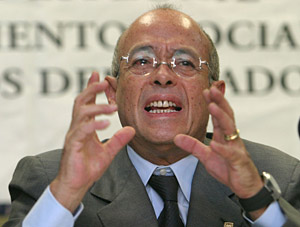 |
 |
 |
 Editorials | Issues | February 2007 Editorials | Issues | February 2007  
Carrillo Insists Collusion Ended ´Dirty War´ Probe
 El Universal El Universal


| | Ignacio Carrillo Prieto |
Ignacio Carrillo Prieto, who during the Fox administration investigated the state-sponsored campaign against leftists carried out a generation ago, said Saturday that his special prosecutor´s office was closed as "punishment" for charging former President Luis Echeverría in connection with two massacres.

Carrillo, whose office was closed in the final days of the Fox administration, told EFE he considered it a "scandal" that the move was made without sufficient explanation.

The official report on the 1960s-1980s "Dirty War," released by Carrillo´s office in November, documented 1,650 cases of torture "in prisons and concentration camps," as well as several massacres, forced disappearances and other crimes carried out during the presidencies of Gustavo Díaz Ordaz (1964-1970); Echeverría, (1970-76); and José López Portillo (1976-82).

According to the government of President Felipe Calderón, who took office in December and is from the same political party as Fox, the prosecutorial office known as Femospp - created at the end of 2001 under the supervision of the executive branch - completed its duties with the publication of the report.

Government officials told EFE the duties of the special prosecutor´s office ended in November and the federal Attorney General´s Office is continuing to pursue the cases of human rights violations during the "Dirty War."

Carrillo, however, criticized the decision to close the office and said it was the fruit of "collusions between the authoritarian past and the not-so-democratic present," referring to the long-ruling Institutional Revolutionary Party that governed during the "Dirty War" and the Fox administration.

"It´s apparent that it is punishment for having reached the highest level of responsibility for a series of crimes," said the prosecutor, who during his tenure brought "genocide" charges against Echeverría for his role in the deaths of at least 25 student demonstrators on Oct. 2, 1968.

Under Mexican law, genocide can refer simply to systematic mass killings rather than the attempted extermination of an entire group.

Carrillo had accused Echeverría - then serving as interior secretary - of ordering snipers to fire on demonstrators, but a judge dropped those charges last year, saying the statute of limitations had run out.

The special prosecutor´s office had earlier charged Echeverría in connection with another attack on students in 1971 when he was president.

But the Supreme Court threw out the charges, finding as in the other case that the 30-year time limit had run out.

Echeverría, now 85, was charged again late last year in the 1968 killings and ordered to face trial. | 
 | |
 |



